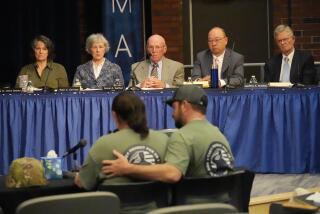Panel Studying State Schools Finds No Signs of Major Mismanagement
- Share via
SACRAMENTO — Members of a commission appointed by Gov. George Deukmejian to look into how well public schools are spending tax dollars said in a preliminary report Friday that they found no evidence of widespread mismanagement of the school system.
The 15-member commission, created by Deukmejian during a dispute with Supt. of Public Instruction Bill Honig over state financial support of the schools, did say that many local school officials are not properly trained to handle multimillion-dollar budgets and called on Honig to play a bigger role in training them.
The report did not address the issue that is at the heart of the dispute between Deukmejian and Honig--whether schools get enough money from the state. Commission President George Christopher said that issue would be addressed in a final report in June.
Basis of Argument
Deukmejian contends the schools could be doing much more than they are without a big infusion of dollars. Honig argues that current levels of state funding do not allow schools to keep up with inflation, the large influx of new students, and finance programs to improve educational quality.
While Deukmejian and Honig have patched up their once-bitter public feud, the basic disagreement still exists.
Honig, after he reviewed the report by the Commission on Educational Quality, said the commission “acknowledged that we’re on the right track” and had validated most of his “major initiatives.”
Deukmejian’s position got some support from commission member Roy Brophy, a Sacramento land developer. “There is no evidence that more money results in higher test scores,” he told reporters.
The commission also called on the state Department of Education to establish more rigorous requirements of students in the school system. Although the state has basic skill-level requirements, the commission said they were “very limited.”
Training in Civics
Among the commission’s suggestions, for example, was that students might be required to have “an understanding of the concept of civic responsibility.” The report said that students “could be required, in order to graduate, to volunteer in a community service program, such as working in a convalescent hospital with senior citizens or working in a facility with developmentally disabled children.”
The commission also said a new and expanded statewide testing system should be developed to measure each student’s progress. The commission called the state’s only current standardized tests, the California Assessment Program (CAP), inadequate.
The commission said testing should be on the basis of sex, race and socioeconomic status “to identify the learning needs” of the diverse segments of the student population. It acknowledged that the Department of Education is in the process of overhauling its testing program.
Problems Cited
As for financial accountability, the commission found that problems at the district level “are not necessarily caused by mismanagement,” but by difficulties in accurately measuring such things as student enrollment and the exact amount of money coming from the state.
The commission said that too often officials in charge of school budgets “have not received appropriate training, education or assistance in the area of business skills.” The report said Honig should step in and “take a stronger leadership role in improving the training of chief school business officials.”
More to Read
Sign up for Essential California
The most important California stories and recommendations in your inbox every morning.
You may occasionally receive promotional content from the Los Angeles Times.










